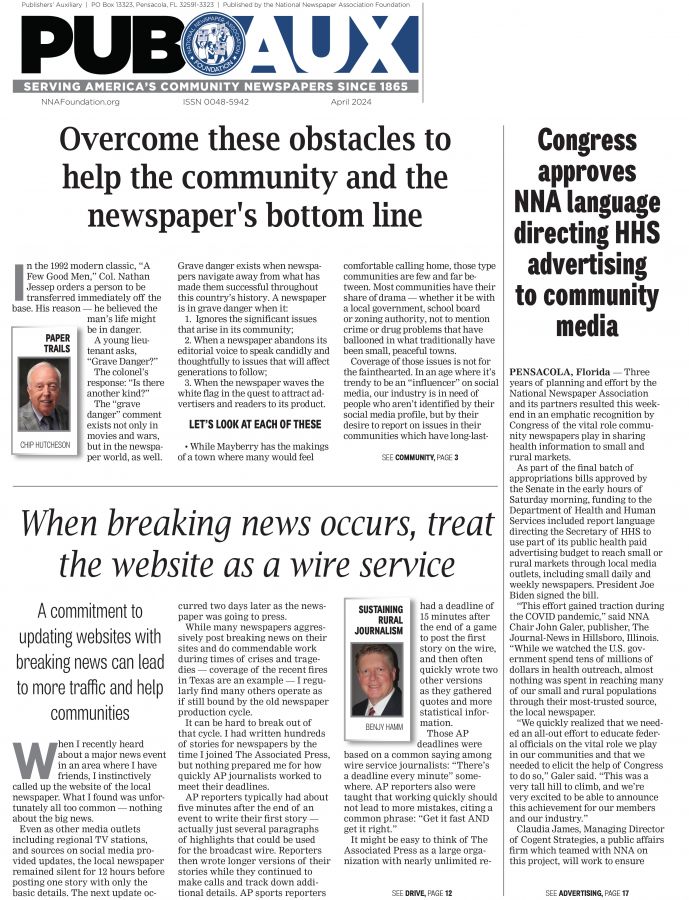Reporters stymied by public information officers
Apr 10, 2013
Group seeks
to expand access
By Vincent Duffy
Chair | RTDNA
“For an interview, please contact our PIO.” These types of stories are all too familiar to journalists.
A Michigan Radio reporter was interviewing a big city mayor over the phone. The mayor was on a speakerphone and the reporter asked the mayor to pick up the handset so the audio quality would be better. The next voice the reporter heard was that of the Public Information Officer, saying that was not going to happen. The PIO needed to monitor the entire conversation.
Good PIOs can be like a time saving one-stop shopping experience. With one phone call they can get you the information you need, schedule the interview with the best source in the organization, and be available for follow up questions.
If that doesn’t sound like the PIOs you call, you’re not alone. PIOs today are more likely trying to manage the media, end interviews if they get difficult, control who you can speak to, and berate you or even call your boss to complain if you try and go around them. Another of my reporters even had a PIO for a charter school company plead with her not to use information he provided, after the PIO discovered he wasn’t supposed to share that information with the press.
Veteran journalists Linda Peterson and Kathryn Foxhall are worried about the damage the growth of PIOs is doing to journalists’ ability to cover government bodies and agencies. In a recent article in Quill (the magazine of the Society of Professional Journalists), they argue that PIOs, more often than not, “serve as censors for their bosses.”
On the phone this week (I didn’t need to go through a PIO), Foxhall told me that many government PIOs are actually working to restrain free speech. Government employees are told their jobs could be in jeopardy if they speak to a reporter without PIO permission, which goes against the idea of open government and hurts society.
Think they’re crying wolf? Recently, New York Department of Transportation engineer Michael Fayette said he was forced out at his job for speaking to the press without permission. His crime? He was quoted in the Adirondack Daily Enterprise praising the work his agency did in the aftermath of Hurricane Irene. That’s right, he praised his organization without permission from the PIO, and he got in big trouble.
He told local media that as part of his disciplinary interrogation (yes, that’s actually what they call it) he was “handed DOT’s ‘News Media Contact’ policy, which says approval of the agency’s public affairs office is required “for any oral or written statement given to news media representatives.” Do you think that might have a chilling effect on the rest of the DOT should they want to talk to the press?
Two years ago Foxhall wrote President Obama objecting to the “permission to speak” policies that force reporters to go through PIOs before speaking to employees. The letter did not create any change. (The Obama administration is not known for its openness.) So Foxhall is gearing up for a real fight. She and a small group of other journalists and academics have created a website called “Stop the New American Censorship.” www.stopthenewamericancensorship.org. Their goal is to stop “government agencies at all levels, hospitals, universities, associations and private companies (from) prohibiting employees to speak to journalists without getting permission from the public information office.”
OK, sure, I hear you, that’s a pretty big windmill at which to tilt, but I agree with the effort.
As part of her project, Foxhall has started a blog to showcase journalists’ reports of policies that force them to go through public information officers (or other officials) and incidents of tracking, monitoring, and blocking of communication by PIOs. If you have your own stories to tell, she’d love to hear them. She can be reached through the website at info@stopthenewamericancensorship.org.







